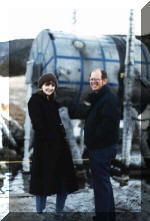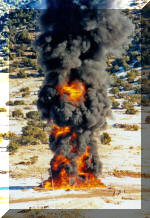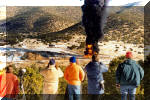 Sharon and our friend Pete, a Sandia
materials scientist and foam expert, with the TRUPACT-II.
Sharon and our friend Pete, a Sandia
materials scientist and foam expert, with the TRUPACT-II.WHEN FIRE CONFERS SAFETY
|
|
|
In January 1989 I traveled on business to Sandia National Laboratory in Albuquerque NM to witness a certification test burn on a purposely dropped and damaged TRansUranic PACkage Transporter, the TRUPACT-II. Note: that Transuranic is a nice way of saying… Plutonium. The unit is a stainless steel sheet metal cylinder with an inner and outer shells. The annular space between the shells is filled with rigid foam. For a short description of the package, use and certification testing see: |
|
|
|
Our company (see company website) had developed and installed the special rigid polyurethane foam into the unit, intended to absorb the kinetic energy of the prescribed highway accident and then to insulate the radioactive materials from the heat of a fuel fire... the famous wreck with a gasoline truck scenario. Of course the purpose of all this protection is to prevent radioactive release into the environment... an event that would definitely make the evening news! The test unit was supported a meter or so above an 8000 gallon jet fuel fire for 30 minutes. The pool is like a shallow swimming pool filled with water. The fuel, I think they used Jet-A (Kerosene) being lighter than water, is floated on top. After 30 minutes the fuel burns off down to the water. |
|
|
|
At the time my daughter Sharon was still attending college at New Mexico Tech in Socorro, about seventy miles South of Albuquerque. So I rented a car, got us a hotel room, drove down and picked her up and brought her to Sandia. We had dinner, got our passes at the Kirtland AFB guard shack, and drove out to the burn site. It was dark and the desert test areas (many square miles) poorly lit. It’s not a place to take a wrong turn (you might get shot). We finally found Coyote Canyon Road and drove the seven or so dirt miles to the burn site. |
|
|
|
Though it was very dark, the TRUPACT was brightly floodlit from portable generators- looking very much like an alien spaceship that had landed in a dessert swimming pool. Workers in white coveralls were scrambling over the test unit installing thermocouples. It was very eerie and surreal. This must have been the way it looked for the first atomic bomb tests in 1945 not so many miles south of here. |
|
|
|
The next morning Sharon and I viewed the 8000
gallon burn along with governor's representatives from all the states the TRUPACTS
would travel through. There were TV cameras from local stations and
lots of press folks. An instrumented airplane flew through
the smoke plume. After the fuel burned off, the red hot TRUPACT kept venting burning foam gasses, a process that I expected to
cease after 30 minutes or so- it actually took nearly an hour. While
the gas jetting was at its worst Sharon turned to me and said- loud
enough for the Department of Energy representative and Channel-4 news
crew to
hear. “Dad- did you forget to put flame retardant in the foam?” Heads
turned and there was nervous laughter. |
 Sharon and our friend Pete, a Sandia
materials scientist and foam expert, with the TRUPACT-II.
Sharon and our friend Pete, a Sandia
materials scientist and foam expert, with the TRUPACT-II.
Sharon trying to stay warm in a Sandia truck. Test unit (note damage) and Sandia test crew ready to go.




Watching the test from a safe
distance. Unit still smoldering,
Nuclear Regulatory Commission witness and TV
channel 4.
Click (here)
to return to Index page